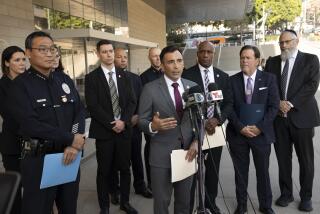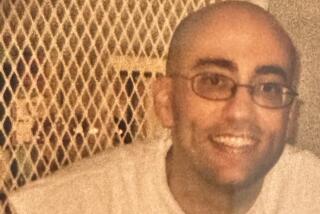Furrow Gets 5 Life Terms for Racist Rampage
- Share via
In an emotionally wrenching hearing, a Los Angeles federal judge sentenced white supremacist Buford O. Furrow Jr. to five life terms Monday for the 1999 murder of a Filipino American postal worker and a shooting rampage that left five people seriously wounded at a San Fernando Valley Jewish community center.
Before he was sentenced, the mentally disturbed Washington state resident expressed his “deepest sorrow” for killing letter carrier Joseph Ileto and wounding three small children, a camp counselor and a receptionist at the Jewish center in Granada Hills.
“I hold myself responsible for what happened. . . . I wish I had been kept in the [mental] hospital I was previously in,” said Furrow, 39, as one of his young victims sobbed.
“I think about what happened every day and I will grieve for it every day the rest of my life,” added Furrow, a longtime follower of the racist and anti-Semitic group Aryan Nations, as he read from a prepared statement in an unemotional tone.
Ileto’s mother and siblings, two of the Jewish center victims and the parents of the three others all spoke movingly of the horror that had been inflicted on them and how they continue to live with it.
Several said that Furrow’s apology rang hollow and that they wished that he had been sentenced to death. “Buford Furrow should be a poster boy for the death penalty,” said Gary Zidell, whose son James was 6 when Furrow shot him in the foot. Zidell was one of several who called Furrow a coward for targeting children.
Under a plea agreement reached in January that spared him the death penalty, Furrow pleaded guilty to 16 felony charges, including five that carry mandatory life terms without possibility of parole. Federal prosecutors dropped their plans to seek death after getting access to voluminous medical records showing that Furrow had tried for a decade to get treatment for homicidal and suicidal urges.
Members of Ileto’s family, who have become activists against hate crime, said Furrow’s mental problems were no excuse for what he did.
“I feel deep inside that he knows the difference between right and wrong,” said Lilian Ileto, the mother of the murder victim. “When he killed my son, he killed a part of me.
‘My son was gunned down like an animal, not shot just once or twice, but nine times,” she said. “My heart aches every day knowing he was suffering. He was killed because he looked like an Asian or a Latino and because he was a federal employee.”
In comments to the FBI shortly after his arrest, Furrow said he shot Ileto because he looked “Asian or Latino” and worked for the government.
“Just saying he’s sorry doesn’t bring back my son,” said Lilian Ileto. “I was brought up to always forgive. We will never go down to that level of hate. . . . I pity Buford. He has to wake up every day and see his reflection in the mirror.”
As she spoke, Furrow nodded in agreement.
Several of the Jewish center parents, speaking at the packed, 80-minute hearing, said their children still suffer nightmares.
“His innocence was taken from him that day and it can’t be restored,” Lauren Lieb said of her son, Joshua Stepakoff, who was 6 when Furrow shot him in the leg.
“He knows that I can’t protect him from madmen. The scar on his leg reminds him of our gun-crazy world and that people want to kill Jews,” said Lieb, who spoke out against hate crimes at the Million Mom March last year.
Perhaps the most wrenching statement came from Mindy Finkelstein, 18, a counselor at the center who was wounded in the leg. While periodically sobbing, Finkelstein said that even though she had become an “instant celebrity,” she quickly dropped out of college after discovering that although her wounds were healed, she was still severely emotionally scarred.
“I’ve been to hell and back,” said Finkelstein. “Buford Furrow tried to kill me and he failed. But in a way, he succeeded.”
Moments later, Finkelstein’s mother Donna told Furrow: “You stole my daughter’s innocence just because she’s Jewish, but you didn’t take away her bravery or her ethnic pride.”
Isabel Shalometh, the 69-year-old receptionist at the Jewish center whom Furrow shot in the abdomen, said: “I hope that people out there get a message that we will not tolerate these hate groups.”
Also wounded in the attack was Ben Kadish, 5, whose mother Eleanor also spoke.
The Jewish victims and Ileto’s family stressed that Furrow’s Aug. 10, 1999, actions had not yielded his expressed goal: “a wake-up call for Americans to kill Jews.”
“You’ve only made our community stronger,” said Ileto’s brother Ismael. “I feel glad the U.S. criminal justice system has said this country won’t tolerate this kind of behavior,” added Ileto.
After the hearing, Ismael Ileto called on Congress and President Bush to “pass a stronger hate crime law and to include sexual orientation in the law.”
After listening to the family members talk for nearly an hour, U.S. District Judge Nora M. Manella told Furrow that his actions were “a stark reminder that bigotry is alive if not well.”
“If you’ve sent a message, it is that even the most violent crimes can strengthen a community.”
In passing sentence, Manella said that federal law provided that two of the life terms must be served consecutively, and she imposed an additional 110 years under federal sentencing guidelines.
Additionally, she said that Furrow is obligated to pay $690,294 in restitution. Because Furrow is indigent, it is unlikely that he will be able to make that payment, but if he ever made any money by selling a book or the rights to movie about his life, the funds could be seized as a result of the restitution order, according to legal experts.
Furrow received the life terms for murdering a federal employee, killing Ileto with a firearm, and interfering with the civil rights of Ileto, Finkelstein and Shalometh.
Furrow, a longtime avowed racist, drove to California from Washington state in August 1999 in a van loaded with weapons and all of his personal belongings, according to federal law enforcement officials.
Before launching his attacks in the San Fernando Valley, the sporadically employed engineer spent several days in the Los Angeles area checking out Jewish facilities as possible targets, including the Museum of Tolerance, the Skirball Cultural Center and the University of Judaism.
The Killer Sought Defenseless Victims
He rejected those sites after concluding that security was too tight, law enforcement sources said.
Ultimately, he settled on the Jewish center, where he sprayed 70 rounds from his rifle at employees and several dozen children enrolled in a summer program. Then, he drove to a shopping center, abandoned his van and stole another car at gunpoint.
A few hours later, he came upon Ileto, 39, delivering mail in a residential neighborhood in Chatsworth. Furrow asked Ileto to mail a letter for him and then fired nine shots into the postal worker, who was so proud of his job that he wore a Postal Service T-shirt on weekends.
Furrow later hailed a cab that he took to Las Vegas. He turned himself in to the FBI the next day.
After Furrow pleaded guilty in January, U.S. Atty. Alejandro N. Mayorkas disclosed that the defendant had been attempting for a decade to obtain treatment for mental health problems.
Mayorkas said that government psychiatrists reviewed and analyzed more than 2,000 pages of medical records, showing that Furrow had checked into psychiatric hospitals three times and also made numerous trips to hospital emergency rooms, complaining about everything from panic attacks to urges to kill himself and others.
Mayorkas said that medical history played a pivotal role in the government’s decision to abandon its initial plan to go to trial and seek the death penalty against a man whose wedding ceremony was performed by Richard Butler, the head of the Aryan Nations group.
On Jan. 24, the day Furrow pleaded guilty, he told Judge Manella that he was taking five types of medications and named them.
Still to be determined is where Furrow will serve his sentence. Manella said she would recommend that Furrow be sent to one of the few federal prisons that have special medical facilities for an initial determination of his mental health. The ultimate decision will be made by officials of the U.S. Bureau of Prisons in Washington, D.C.
Monday’s hearing was attended by more than a dozen postal workers in uniform, as well as representatives of the Asian and Jewish communities.
“What could have been an isolating experience for the [Ileto] family has turned out to be inspirational,” said Stewart Kwoh, executive director of the Asian Pacific American Legal Center. The family, he said, has formed a special bond with the Jewish community.
Rabbi Abraham Cooper of the Simon Wiesenthal Center said Furrow’s apology “robs the far right extremists of a martyr for their cause. I just wish the people in this country who say there is no such thing as a ‘hate crime’ had been in court today.”
More to Read
Sign up for Essential California
The most important California stories and recommendations in your inbox every morning.
You may occasionally receive promotional content from the Los Angeles Times.













